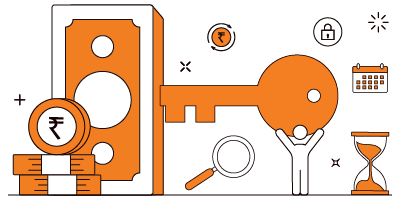Looking to park your money in a safe investment product with the low risk of fixed deposits and yet gives you better returns?
All through your childhood, your parents probably told you to save for your future. Which is what you dutifully do — but do you really want to be holding on to cash that may not fetch you great returns in the long run?
Here’s why you shouldn’t listen to them anymore!
1. Make more money while the economy is making less!
Liquid investment options in a high growth economy are your safe bet if you want to keep beating inflation, while the cash in your savings deposit depreciates in value. Liquid funds tend to beat the inflation, ensuring that the money you have deposited will have the same purchasing power even a few years from now. Sure, keeping your money in a savings account will ensure that you always have money to spend. But wouldn’t you rather you left your money in a low-risk environment that will provide a stable return?
2. No lock-in period, and no entry and exit loads
Do you really want to be charged every time you decide to take some money out of your account for expenses that can’t be avoided? With a liquid fund, you no longer need to worry about taking money out. Since there is no exit load, you can take out the money you’ve invested, be it in 6 days or even six years, if you desperately need it for an emergency!
3. Invest while keeping the money accessible
While you can take the money out of your savings account anytime, invested money in a liquid fund comes back to you in 1 day. In some cases, the money comes back to you in 30 min! We hear that there are fund houses that are trying to bring down the time to 5 minutes. Do you still want a fourth reason? We give you one nonetheless.
4. Limit your spending on nights out and impulses
Putting your cash in a liquid fund means that you don’t have the money kept readily in a savings deposit. It ensures that you aren’t frivolously spending your money on a weekend out, instead of saving it for something you’d need much more in the future — perhaps a car, or a planned trip abroad!
5. If this is for real, why is this still a secret?
These funds have the lowest commissions of all. The banks hardly make any money selling this to you. They prefer selling you an insurance linked product or a fixed deposit.
Let’s do the math*

Let’s assume you leave Rs.10,000 every month in your savings account. By the end of 20 years, you would have saved Rs.24Lakhs, and the bank would have given you an interest of Rs.10.8Lakhs(@3.5%).
Rs.34.8Lakhs is not bad, right? Adjust that for inflation and your money is worth Rs.18.9L. You’ll lose Rs.5.1L. Now, that’s the catch.
FDs would have fared better, right? Just a wee bit better, FDs would’ve created a corpus of Rs.46L, after taxes (Rs.12.8L more than savings account). Adjust that for inflation and you are back to square one at Rs.26.8L for your Rs.24L invested!
With liquid funds, you’d have a corpus of Rs.73.9L, after taxes. That’s Rs.36.8L adjusted for inflation. 4.57 times more returns than FD (Rs.12.8L Vs Rs.2.8L).
They are not the best returns products, but for a similar risk as Fixed Deposits, and much better access to money (penalty or exit load), this is the best that is available.
We recommend that there are better ways to invest in safer products but returns better than Savings or Better than FDs.
Now share this secret with your parents, friends that really matter and your friendly neighbourhood banker or agent. If your parents’ retirement fund is parked in FDs, consider suggesting them this page “Better than Fixed Deposits (FD)”
*For our calculation, we have used UTI Treasury Advantage Flexi Dividend fund to calculate returns for Liquid funds. 6% as inflation rate.
RELATED LINKS

















Show comments